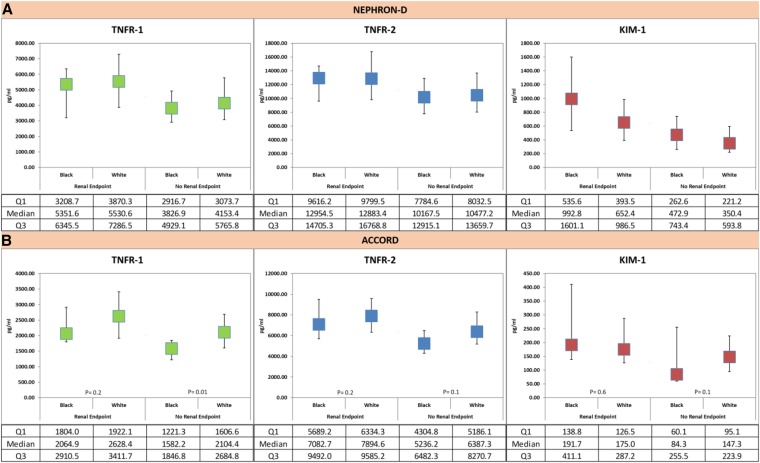We appreciate the suggestions by Hickson et al.1 for additional analysis by race and sex on plasma biomarkers and their association with renal outcomes in the Action to Control Cardiovascular Disease (ACCORD) trial and the Veterans Affairs Nephropathy in Diabetes (VA NEPHRON-D) trial cohorts.2
We analyzed the differences in the distribution by race and sex, and we also analyzed whether there was effect modification of race and sex on the association between the biomarkers and the renal outcomes.
There was no relationship between sex and concentrations of the three plasma biomarkers in the ACCORD cohort (Figure 1). There were only ten women of the 1156 participants in the VA NEPHRON-D cohort; thus, the sample size is too small to make inferences on sex differences. As shown in Figure 2, there were no differences in TNFR1 or TNFR2 by race in the VA NEPHRON-D cohort. There was no clear relationship between race and KIM-1 levels in the VA NEPHRON-D or the ACCORD cohorts.
Figure 1.
There is no relationship between sex and the distribution of biomarkers in the ACCORD trial, stratified by outcome. Q, quartile.
Figure 2.
Lower TNFR1 and TNFR2 concentrations in black participants in ACCORD, stratified by renal outcome. (A) shows no differences in TNFR1, TNFR2, or KIM-1 by race in the VA NEPHRON-D cohort. (B) shows the lower TNFR1 and TNFR2 in black participants in ACCORD, with no clear relationship in KIM-1 levels by race in ACCORD. Q, quartile.
In contrast, TNFR1 was approximately 25%–30% lower in blacks in the ACCORD cohort, and TNFR2 was approximately 10%–17% lower in the ACCORD cohort (Figure 2). In a regression model containing black (versus other race), age, sex, eGFR, urine albumin to creatinine ratio, BP, medications (angiotensin-converting enzyme inhibitor/angiotensin receptor blocker), glycemic arm, fibrates arm, and renal outcome status, the β-coefficient for black race for the linear outcome of log2 of TNFR1 levels was −0.24 (SEM=0.1; P=0.03), and it was −0.14 (SEM=0.1; P=0.09) for TNFR2 in the ACCORD cohort. Although there were some differences in the baseline biomarker values by race, there were no statistically significant interactions by race on the associations between the biomarkers and the kidney outcomes in the ACCORD and the VA NEPHRON-D cohorts. Thus, although there may be differing cutoffs of risk by race/ethnicity, the biomarkers are similarly prognostic for renal outcomes in all races. Determination of biomarker cutoffs/thresholds by race will require larger, multiethnic cohorts with longitudinal follow-up.
Disclosures
S.G.C. is supported by National Institutes of Health (NIH)/National Institute of Diabetes and Digestive and Kidney Diseases (NIDDK) grant R01DK096549. G.N.N. is supported by NIH/NIDDK grant K23DK107908. S.G.C., G.N.N., and C.R.P. are members and are supported in part by the Chronic Kidney Disease Biomarker Consortium (U01DK106962).
Footnotes
Published online ahead of print. Publication date available at www.jasn.org.
References
- 1.Hickson LJ, Balls-Berry JE, Jaffe AS, Rule AD: Biomarkers associate with progression of diabetic kidney disease: do they hold the same meaning for blacks and women. J Am Soc Nephrol 29: XXX–XXX, 2018 [DOI] [PMC free article] [PubMed] [Google Scholar]
- 2.Coca SG, Nadkarni GN, Huang Y, Moledina DG, Rao V, Zhang J, et al. : Plasma biomarkers and kidney function decline in early and established diabetic kidney disease. J Am Soc Nephrol 28: 2786–2793, 2017 [DOI] [PMC free article] [PubMed] [Google Scholar]




